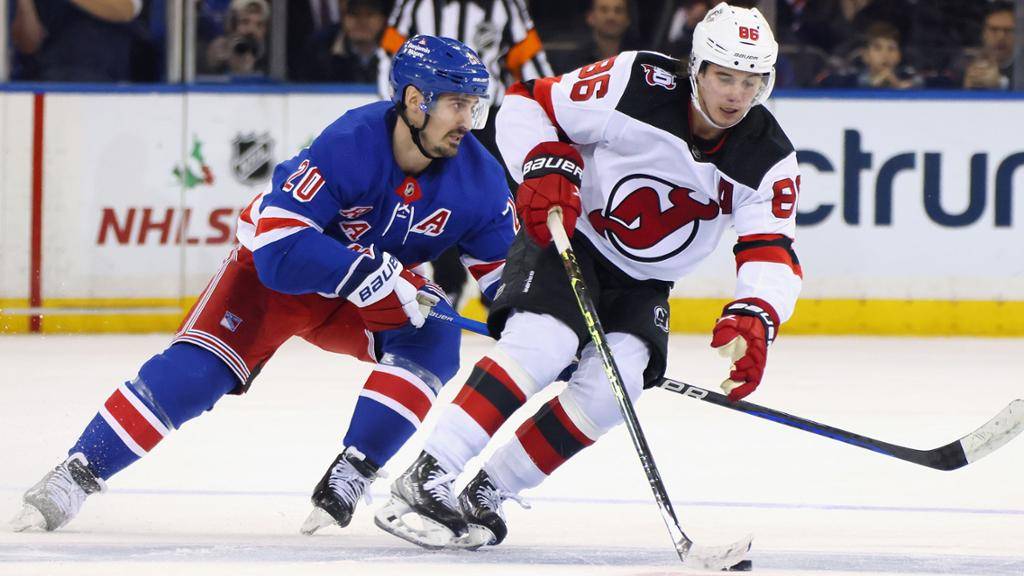| Rangers | NHL Regular Season Rankings | Devils |
| 47-22-13 | Record | 55-22-8 |
| 9th | NHL Standing Rank | 3rd |
| 12th | GF/PG | 5th |
| 4th | GA/PG | 8th |
| 7th | PP% | 13th |
| 13th | PK% | 4th |
Point Leaders
Rangers – Artemi Panarin 92, Mika Zibanejad 91, Adam Fox 72, Vincent Trocheck 64
Devils – Jack Hughes 99, Nick Hischier 80, Dougie Hamilton 74, Jesper Bratt 73
The two teams are similar in terms of their leading point scorers. The Blueshirts had two players eclipse 90 points, whereas the Devils had four players record over 70 points. Each team has one offensive defenseman who finished third on their respective team in points and are capable of being a difference maker.
New Faces
Rangers – Vladimir Tarasenko, Patrick Kane
Devils – Timo Meier, Luke Hughes
Both teams made big acquisitions ahead of the trade deadline. For the Rangers, Vladimir Tarasenko, and Patrick Kane. Both players have won Stanley Cups and have the pedigree for being key contributors in a playoff run. Kane has 132 points in 136 career playoff games and has three Stanley Cups on his resume.
For the Devils, they landed the biggest fish available at the trade deadline by acquiring Timo Meier from the San Jose Sharks. Meier recorded 14 points in 21 games as a member of the Devils. Meier is on an expiring contract and is an unrestricted free agent after the conclusion of the playoffs. Perhaps more interesting is defenseman Luke Hughes slated to play a role in the series at some point. Hughes is a former top-five overall pick and the younger brother to the Devils leading point scorer Jack Hughes. Luke’s collegiate season ended in the Frozen Four as Michigan bowed out to eventual champions Quinnipiac. Hughes will likely be fighting Kevin Bahl for a place in the Devils lineup. If the 19-year-old suits up, it will be just his third career NHL game.
Goaltending
Igor Shesterkin – 37-13-8, 2.48 goals-against average, .916 save percentage
Vitek Vanecek – 33-11-4, 2.45 goals-against average, .911 save percentage
While the two netminders have similar stats this season, the clear advantage goes to the Rangers with Igor Shesterkin. Shesterkin had a rough go in the first-round of the playoffs last season against the Penguins, but he managed to overcome that and play at a high level for the remainder of the playoff run. Many hockey fans across the world consider Shesterkin one of the best goaltenders on the planet and his ability to play the puck makes him even more dangerous.
Vanecek on the other hand is looking to prove that he can be a starter and the guy for a contending team. Vanecek has played in just three playoff games in his career and he is 1-1 and he has a no-decision. Vanecek’s highest playoff save percentage in a single game is .865. The 27-year-old has a career record of 7-3-1 against the Rangers and is 6-0-1 in his last seven against New York.
Rangers Advantage
Perhaps one of the biggest advantages, besides goaltending, for the Blueshirts is having significant playoff experience with this core of players from the previous season and having players acquired from teams who have previously won a Stanley Cup. Last season, the Rangers went to the Eastern Conference Final before losing in six-games to the Tampa Bay Lightning. They also have three former Stanley Cup winners between Kane, Tarasenko, and Barclay Goodrow. Kane won three Stanley Cups with the Blackhawks, while Goodrow has a pair with the Tampa Bay Lightning. Meanwhile, many key players on New Jersey are about to taste playoffs for the first time and their only player to have won the Stanley Cup previously is Ondrej Palat. Palat was on the same Lightning team as Goodrow when they won back-to-back championships
Devils Advantage
For the Devils, their biggest advantage is the speed and tempo at which they play at. They play a quick game and have players who can burn you in transition including Jesper Bratt and Miles Wood. New Jersey’s speed gave the Rangers all kinds of problems which they struggled to deal with. The Devils won three of four matchups and the Rangers didn’t defeat them one time in regulation this season. To go along with their speed, New Jersey’s expectations entering the year were low. Many had them at best fighting for a playoff spot, but few if any could predict them finishing as the third best team in the league. The Devils can play without the burden of expectation and knowing they had a successful season regardless of the outcome in the series. Meanwhile, the Blueshirts came into this season with high expectations as they look to take the next step.
Regular Season Note
New Jersey finished with five more wins and six places higher than the Rangers this season. Despite this, these two teams are even closer than they already appear. In the regulation loss column above, each team finished the season with 22 regulation defeats. This means that both teams either won or lost beyond regulation 60 times. In the regular season, overtime rules consist of five minutes of three-on-three hockey, followed by a shootout if no one scores. In the postseason, teams play continuous five-on-five hockey until one team scores. This means that what happened beyond regulation in the regular season is not indictive of what we will see in the postseason and thus the two teams are equal in that sense.
Key for the Rangers
The key for the Blueshirts is slowing down the Devils and not letting their speed take over the game. In the playoffs, space tends to harder to find and the game tightens up. This favors the Rangers if the usual trend in the playoffs continue. Most importantly, the Rangers will need to rely on their goaltending as it is there one clear advantage over the Devils. The two teams are very similar in many aspects, and the series could simply come down to which goaltender will make the right save at the right time.
Projected Lineup
Kreider-Zibanejad-Kane
Panarin-Trocheck-Tarasenko
Lafreniere-Chytil-Kakko
Vesey-Goodrow-Motte
Lindgren-Fox
Miller-Trouba
Mikkola-Schneider
Shesterkin




